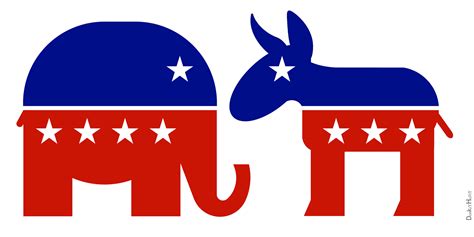Donkeys and Elephants
|
A political party is an organized body of like-minded people who work to elect candidates for public office who represent their values on matters of policy. In the U.S., home to a strong two-party system, the major political parties are the Republicans and the Democrats. But there are many other smaller and less well organized political parties that also nominate candidates for public office; among the most prominent of these are the Green Party, the Libertarian Party, and the Constitution Party, all three of which have run candidates for president in modern elections. Still, only Republicans and Democrats have served in the White House since 1852.
The first political parties—the Federalists and the anti-Federalists—emerged from the debate over ratification of the U.S. Constitution in 1787. The formation of the second party further illustrates one of the primary functions of political parties: serving as opposition to another faction with diametrically opposed values. In this particular case, the Federalists were arguing for a strong central government and the opposing Anti-Federalists wanted the states to hold more power. The Democratic-Republicans followed soon after, founded by Thomas Jefferson and James Madison to oppose the Federalists. Then came Democrats and the Whigs. No third-party candidate has ever been elected to the White House in modern history, and very few have won seats in either the House of Representatives or the U.S. Senate. The most notable exception to the two party system is U.S. Sen. Bernie Sanders of Vermont, a socialist whose campaign for the 2016 Democratic presidential nomination invigorated liberal members of the party. The closest any independent presidential candidate has come to being elected to the White House was billionaire Texan Ross Perot, who won 19 percent of the popular vote in the 1992 election. |
The Dominant Political Parties in the United States today are the Democrats and the Republicans
|
When you have completed your study of the democrats and republicans, answer the following questions:
- What are two differences between the Republican and Democratic parties that may have an ethical impact (positively or negatively) on the American people?
- How do political parties influence the election process?
- How do political parties gain power in the United States?
